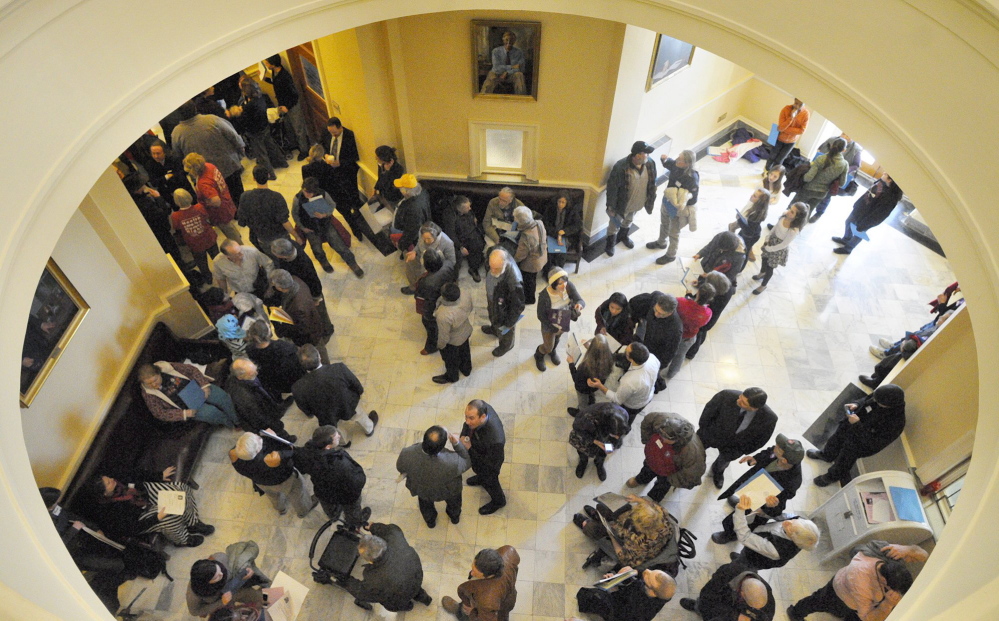The Maine House will take up the MaineCare expansion bill this week and members should be clear about what’s at stake.
The bill would accept federal funds for three years to cover as many as 70,000 uninsured people with the state’s version of Medicaid. After two years of debate, you’d think that much would be clear, but it’s not.
The LePage administration and its allies called it a budget-busting expansion of welfare, even after the nonpartisan Office of Fiscal and Program Review determined that it would be a financial plus for the state. The opponents have said it would run up unpaid bills to Maine’s hospitals, but the Maine Hospital Association says just the opposite, saying that not expanding MaineCare would put their members at a fiscal disadvantage.
And the governor has called the bill “sinful” because some elderly and disabled MaineCare recipients remain on waiting lists for additional services, even though defeating the bill would not shorten those lists and passing it would. The compromise bill sponsored by Republican Sen. Roger Katz would direct funding toward reducing and eliminating the waiting lists over time.
SUBSIDIZED COVERAGE NO BARGAIN FOR MANY
Now the opponents argue that the expansion is unnecessary because most of the people who would receive MaineCare coverage are already eligible for subsidized health insurance under the Affordable Care Act. But this is also not a reason to defeat MaineCare expansion.
While it’s true that some of the people could buy subsidized insurance on the exchange, tens of thousands would not.
People who earn less than poverty level – $12,700 for an individual – but are not now eligible for MaineCare would get no subsidy at all. That population has been estimated at 36,000 Mainers.
Individuals who earn more than the poverty level and less than $15,600 would be eligible for subsidies, but they could still find the plans too expensive. The plan with the lowest premium would expose the customer to $6,000 or more in annual out-of-pocket costs. Even under the most subsidized plan, a consumer would spend $60 a year in premiums and up to $500 in cost sharing. While that might not sound like much, to someone earning $200 a week, it could be a major financial hardship.
It’s safe to assume that not everyone eligible for insurance through the exchange will buy it, and along with the people who earn too little for subsidies, they will go without insurance.
PUTTING MAINERS’ HEALTH AT RISK
The administration and Republicans in the Legislature usually refer to this population as “able-bodied,” but there is no reason to assume that they are healthy. They include people with chronic conditions like asthma or diabetes that go untreated until they have a crisis that lands them in an emergency room. Some of them can be expected to have undiagnosed heart disease or cancer. Others have mental illness or addictions to alcohol, drugs or cigarettes that can have disastrous health consequences if not addressed.
There can be a lively debate about how many thousand people will remain uninsured if Maine does not participate in the federal program, but there is one aspect of this bill that should be beyond debate: We know that people with health coverage live longer and healthier lives than people who are uninsured. It stands to reason that many of the people who would be covered under expanded MaineCare and will remain uninsured without it will get sick this year, and some of them will die as a result.
And that is what this bill is about. Members of the House opposed to this expansion should explain why they are voting to risk lives to keep people uninsured when there is a federally funded option available right now.
This debate has gone on too long. It’s finally time to address the real issue.
Send questions/comments to the editors.



Success. Please wait for the page to reload. If the page does not reload within 5 seconds, please refresh the page.
Enter your email and password to access comments.
Hi, to comment on stories you must . This profile is in addition to your subscription and website login.
Already have a commenting profile? .
Invalid username/password.
Please check your email to confirm and complete your registration.
Only subscribers are eligible to post comments. Please subscribe or login first for digital access. Here’s why.
Use the form below to reset your password. When you've submitted your account email, we will send an email with a reset code.